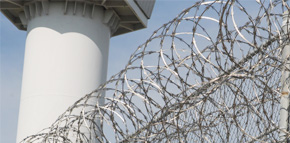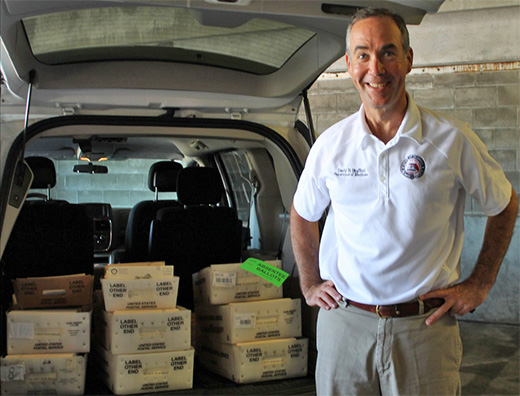July Gardening Tips
July 16, 2016
The heat, humidity and frequent rains of July are great for tropical plants. Gardeners, however, take a bit of a beating. Remember to keep the sunscreen, insect repellant and iced tea handy as you venture out into your garden to perform some needed summer maintenance.
A midsummer application of fertilizer is usually required, especially on annual flowers, lawns, shrub beds and vegetable gardens. This is a supplemental application, so don’t overdo it. A 15-0-15 slow-release fertilizer is a good general purpose landscape fertilizer for most plants.
Major pruning jobs should have been done earlier, but there is still some maintenance pruning that should be done. Deadhead, or clip old flowers, from summer flowering shrubs as soon as they fade to help insure an extended season of bloom. Crape myrtles, hibiscus, hydrangeas and althea are examples of shrubs that will bloom repeatedly if light, selective pruning is done.
 Flowering annuals also respond well to deadheading. Snip off old flowers and flower spikes before they have an opportunity to form seed. Allowing annual flowers to set seed can shorten their blooming season considerably.
Flowering annuals also respond well to deadheading. Snip off old flowers and flower spikes before they have an opportunity to form seed. Allowing annual flowers to set seed can shorten their blooming season considerably.
Inspect your lawn and shrub plantings frequently in order to identify pest problems as early as possible. The most severe damage from pest insects normally begins in July. Be on the lookout for chinch bugs in St. Augustine grass; spittlebugs in centipede grass; sod webworm in all lawns-especially new ones; lacebug and caterpillars on azaleas; whiteflies on gardenia and spider mites on lots of different types of shrubs.
Sod webworms often attack lawns in the summer. They eat the grass blades producing areas that look as if they have been mowed too short. Close inspection will reveal that the blades have not been cleanly cut as with a mower blade but have been chewed along their edges and tips. These caterpillars feed at night and rest during the day down among the runners and in the thatch.
 Once an insect pest is found, evaluate the damage and determine if control is necessary. If it is, choose the least toxic option. If only a few caterpillars are found, hand picking might be the choice. Aphids and spider mites can often be controlled by spraying with an insecticidal soap solution. Chemical insecticides are sometimes required. Before choosing one be sure that the insect pest has been properly identified and that the insecticide is labeled for that purpose For vegetable gardeners that have problems with nematodes, soil borne diseases and extensive weed problems, July is a great time to try soil solarization.
Once an insect pest is found, evaluate the damage and determine if control is necessary. If it is, choose the least toxic option. If only a few caterpillars are found, hand picking might be the choice. Aphids and spider mites can often be controlled by spraying with an insecticidal soap solution. Chemical insecticides are sometimes required. Before choosing one be sure that the insect pest has been properly identified and that the insecticide is labeled for that purpose For vegetable gardeners that have problems with nematodes, soil borne diseases and extensive weed problems, July is a great time to try soil solarization.
Prepare the soil as you normally would for a vegetable garden including adding organic matter. Moisten the area and cover with clear plastic, not black plastic. Clear plastic will produce the highest temperatures. Be sure to weigh down the edges of the plastic so that it doesn’t blow up. Allow the soil to bake in the sun for four to six weeks. The sun will raise the soil temperature high enough to kill many soil borne problems.
Tip of the Week: The nice thing about tomatoes is that you have the option of harvesting when the fruit is green if needed. Tomatoes will ripen indoors at room temperature. To ensure even ripening, place the tomato with the stem up. The ideal time to harvest tomatoes is when they are fully colored but still firm.
In general, it is best to harvest vegetables early in the mornings while the moisture content is higher. The overall quality will quickly diminish as vegetables are exposed to hotter temperatures later in the day.
Florida Delegation Looks To Unite At GOP Convention
July 16, 2016
A year ago, some Florida Republicans dared to dream that one of the state’s own would be accepting the GOP presidential nomination in Cleveland at next week’s convention.
Former Gov. Jeb Bush was the front-runner, with piles of campaign contributions and a name that, for all of its baggage, designated him as a member of the party’s unofficial first family. And U.S. Sen. Marco Rubio, young and Hispanic in a party struggling with both of those demographics, showed up in polls as seemingly everyone’s second choice, a prime position to pick up support once other candidates dropped out.
Instead, Bush couldn’t even make it to the Florida primary after devastating losses in states that voted earlier, and Rubio suspended his campaign after getting smashed by businessman Donald Trump in the Sunshine State — part of the real-estate mogul’s romp to the nomination.
Meanwhile, the primary and its aftermath exposed fault lines in the Florida GOP, divisions that party leaders will hope to heal, or at least patch over, during the party gathering in Cleveland. Especially since the electoral math for any Republican hoping to win the White House remains daunting without Florida.
“It’s already, we know, going to be very, very close, and Florida’s going to again be critical to Republican success. … The importance of unity for Florida is elevated this time out,” said Susan MacManus, a political science professor at the University of South Florida.
Much of the discussion in the lead-up to the gathering, though, has highlighted the fissures in the state GOP. Gov. Rick Scott, who emerged as an enthusiastic Trump supporter following the Florida primary, is scheduled to speak at the convention. So is Attorney General Pam Bondi, the highest-profile Republican in the state to endorse Trump before Floridians voted.
But others are staying away completely. Bush won’t attend, and Rubio will be campaigning for re-election in Florida after his surprise decision last month to run for another term in the Senate.
Some members of the state’s congressional delegation also won’t be in attendance. Congressman Carlos Curbelo, one of Trump’s harshest critics in the Florida GOP, reportedly won’t go. The offices of Congressmen Rich Nugent, Tom Rooney, Dennis Ross and Dan Webster told The News Service of Florida they won’t be in Cleveland next week.
“The congressman has a full schedule of events next week, and will not be attending the convention in Cleveland,” Elizabeth Tyrrell, a spokeswoman for Webster, wrote in an email.
Other lawmakers will be there. Congressmen Ander Crenshaw and Jeff Miller are delegates, while Congressmen Ted Yoho and Gus Bilirakis also plan to attend, according to their offices.
Most Florida Republicans who won’t attend either didn’t provide a reason for skipping the gathering or chalked it up to some reason other than the outsized presence of Trump, one of the party’s most controversial nominees in years.
“I’m not a delegate and I’d rather be home, to be honest,” said state Senate President Andy Gardiner, R-Orlando.
But if political calculations are driving some GOP candidates to avoid Cleveland, other Republicans are taking flak for staying home. Carlos Beruff, a developer challenging Rubio for the GOP nomination for the U.S. Senate seat, slammed Rubio for backtracking on speaking at the convention and offered to take his spot.
“It’s no surprise that Marco Rubio and others are shying away from supporting Donald Trump. … Trump is (motivating) voters across Florida and the country who have felt ignored by the Republican and Democratic establishment alike. He’s looking to shake up Washington, and I’m behind him 100 percent,” Beruff said.
There will also be agendas at play beyond 2016. Agriculture Commissioner Adam Putnam, a top candidate to run for governor in 2018, will host the state’s delegates at a “Florida Grown Breakfast” on Tuesday, featuring neurosurgeon and former presidential candidate Ben Carson.
Other marquee names are likely to speak to the Florida delegation, either to help promote the party’s chances in 2016 or to boost their own profiles for future bids for office, perhaps the presidency in 2020 if Trump falls short.
“You can see raw ambition at every level,” MacManus said.
by Brandon Larrabee, The News Service of Florida
Ballots On The Way To Military And Overseas Voters
July 16, 2016
The Escambia County Supervisor of Elections Office began sending vote-by-mail ballots on Friday, July 15, to eligible military and overseas citizens. Voters will either receive their ballot by mail or electronically, depending on their chosen method of delivery. Absent military voters and those living overseas can request, mark and track their vote-by-mail ballots electronically.
Vote-by-mail ballots for all eligible domestic voters will be mailed beginning on Monday, July 25. The deadline to request a vote-by-mail ballot to be mailed for the Primary Election is 5 p.m. on Wednesday, August 24. To request or track your vote-by-mail ballot for the Primary Election, visit EscambiaVotes.com and click “Vote by Mail”, or contact the Supervisor of Elections Office at (850) 595-3900.
Across the state, county supervisors of elections have already sent out more than 1.5 million ballots to overseas and military voters.
Of the ballots already out statewide, Republicans accounted for 626,019 and Democrats accounted for 610,328. Another 250,261 ballots went to people with no party affiliation and 36,457 were sent to people registered with one of the state’s minor parties.
The News Service of Florida contributed to this report.
Pictured: Escambia County Supervisor of Elections David Stafford with vote-by-mail ballots on their way overseas and to military voters. Courtesy photo for NorthEscambia.com, click to enlarge.
Florida Gov’t Weekly Roundup: In The Background For A Bit
July 16, 2016
When it came to news, it was hard for Florida to get a word in edgewise this week.
 Republican presidential candidate Donald Trump selected Indiana Gov. Mike Pence as his running mate. There was a brutal terror attack in the French city of Nice. And on Friday, an attempted coup in Turkey threw into grave doubt the future of one of America’s NATO allies.
Republican presidential candidate Donald Trump selected Indiana Gov. Mike Pence as his running mate. There was a brutal terror attack in the French city of Nice. And on Friday, an attempted coup in Turkey threw into grave doubt the future of one of America’s NATO allies.
By comparison, things in Florida seemed rather tame. There were some polls about whether Trump or former Secretary of State Hillary Clinton, his Democratic opponent, had the upper edge in Florida with the national political conventions looming. The fight over kosher food at state prisons drew closer to a conclusion. And algae continued to muck things up in southern parts of the state.
None of which will diminish Florida’s reputation as odd news capital of the world, of course. But it did keep the spotlight off the Sunshine State for a few days.
OPPOSITE CONCLUSIONS
Who’s leading the presidential race in Florida, a state that is once again shaping up as one of the most important in the nation? It depends on whom you ask.
Quinnipiac University, one of the highest-profile independent polls, showed Trump taking a narrow lead over Clinton in Florida, with 42 percent of voters favoring the real estate mogul and 39 percent backing the first female major-party nominee. The margin grew to five points when pollsters added a pair of third-party candidates — Libertarian Gary Johnson and the Green Party’s Jill Stein.
The results of the head-to-head match-up between Clinton and Trump marked an 11-point swing in about three weeks. Peter A. Brown, assistant director of the poll, said Clinton’s numbers might have been dragged down by FBI Director James Comey, who publicly criticized the nominee for being “extremely careless” with email during her time as secretary of state, though Clinton was not charged with a crime.
“While there is no definite link between Clinton’s drop in Florida and the U.S. Justice Department decision not to prosecute her for her handling of e-mails, she has lost ground to Trump on questions which measure moral standards and honesty,” Brown said in comments accompanying the poll results.
But some Democrats were skeptical of the poll released Wednesday by the Connecticut-based university. In a blog post, Democratic strategist Steve Schale said he had no doubt Florida will be tight in November — but that the trend in Quinnipiac’s numbers lacked a ring of accuracy.
“For as much of a mess as Florida can be, it is a remarkably consistent state,” he said. “There just isn’t 10-12 points of movement here.”
And by Friday, another survey gave Clinton the lead. The NBC News/Wall Street Journal/Marist Poll showed the former secretary of state up 44 percent to 37 percent, and by five points when the third-party candidates were factored in.
Lee M. Miringoff, director of The Marist College Institute for Public Opinion, said in comments released with the poll numbers that Trump is “playing catchup” against Clinton in Florida, Colorado, North Carolina and Virginia. The institute, part of New York-based Marist College, also released results Friday showing Clinton ahead in those three other battleground states.
“The driving force behind voters’ choices is the negative impressions they have of both Trump and Clinton,” Miringoff said. “Clinton’s single-digit lead in each of these states is due to her slight advantage in how voters perceive the two candidates.”
Get ready for another nail-biter in the Sunshine State.
COURT MAKES NO BONES ABOUT PRISON FOOD
Complaints about meals in jail are probably about as old as jails themselves. But an appeals court on Thursday upheld a lower court’s decision to require Florida corrections officials to provide kosher meals to inmates.
U.S. District Judge Patricia Seitz last year ordered the Department of Corrections to offer kosher meals and barred it from removing inmates from the religious dietary plan if prisoners buy non-kosher food from canteens or don’t pick up the meals more than 10 percent of the time.
Corrections Secretary Julie Jones has maintained she has no plans to stop offering kosher meals. But her agency has argued that a federal law — the “Religious Land Use and Institutionalized Persons Act” of 2000 — allows prison officials to stop offering the meal plan if it gets too expensive.
A three-judge panel of the 11th U.S. Circuit Court of Appeals ruled Thursday that Jones and the agency failed to prove their case. The state has spent nearly $500,000 on legal fees and costs in the prolonged dispute.
Jones “fail(ed) to explain why the department cannot offer kosher meals when the Federal Bureau of Prisons and other states do so,” or why she can’t provide the kosher meals although the department offers other special diets “at similar marginal costs,” wrote appeals court Judge William Pryor.
Corrections officials were reviewing the court’s decision and “will determine next steps,” agency spokeswoman Michelle Glady said in an email Thursday evening.
“We will continue to serve the more than 9,000 inmates enrolled in the religious dietary program meals that comply with the tenets of their faith,” she said.
The fight over kosher meals in Florida prisons has dragged on for more than a decade.
The department started offering kosher meals in 2004 to Jewish prisoners at 13 facilities and transferred inmates who were eligible for the meals to those institutions. The agency expanded the program to inmates of all faiths in 2006 but halted it the following year before reinstating it as a pilot project at a single prison in 2010, serving fewer than 20 prisoners.
A year after the Justice Department filed the lawsuit in 2012, the state again began serving kosher meals and promised to have the meals available to all inmates by last July.
About 9,000 of the state’s 100,000 prisoners are receiving kosher meals, according to Glady. As of Monday, the state was spending $3.32 per inmate per day on kosher meals, compared to about $1.97 for the regular diet.
POLITICAL MUCKRAKING
Amid a blossoming problem with toxic algae linked to water releases from Lake Okeechobee, the state this week opened its bridge-loan program to businesses in Southeast and Southwest Florida that have been hurt by the crisis.
By Thursday, 59 businesses — mostly in Martin, St. Lucie and Lee counties — had reported some form of financial impacts from the toxic blooms.
Florida Department of Economic Opportunity Executive Director Cissy Proctor said the impacts include such things as a decrease in tourists to the counties, fewer people going to restaurants and fewer people using recreational facilities on or near the water.
“We’ve seen the reports of these blooms not only on our local news, but on the national news,” Proctor said. “And we’re also seeing that even if (people) are going down to visit, they’re not going out on their boats. They’re not going out to see the manatees. They’re not going out to do the things that you normally do, especially in these areas on the water that are recreationally or are part of these folks’ livelihood.”
The loans are available only to businesses in four counties in which Gov. Rick Scott has declared an emergency: Martin, St. Lucie, Lee and Palm Beach.
But assistance for businesspeople affected by the problems also caused a political storm this week after Scott’s office posted on the state’s Sunburst email system a chain of emails in which Democratic Congressman Patrick Murphy’s office on Monday requested a delay in announcing the opening of a Small Business Administration recovery center. The potential delay could have led to an announcement during a press conference Murphy was holding Thursday about the algae issue.
Opponents on both sides pounced on Murphy’s request. Congressman Alan Grayson, who is running against Murphy in the Aug. 30 Democratic primary for a U.S. Senate seat, called Murphy’s action an abuse of power.
“Putting his own political fortunes in front of the needs of legitimate small business owners is stunningly shameless,” Grayson campaign manager Michael Ceraso said in a release.
Meanwhile, Carlos Beruff, a developer from Bradenton seeking to become the Republican Senate nominee, went further, demanding Murphy “resign his office immediately” and be investigated by the House Committee on Ethics.
But Murphy’s campaign fired back, saying it was Scott’s office “looking to score partisan points” that took out of context a “standard request to coordinate a media strategy with a federal agency.”
“Of course our office did not request for this program to be delayed,” Murphy campaign spokesman Anthony Kusich said in a statement. “Anyone who reads the original email can see that we did not. The official emails that Republicans are distributing to press intentionally leave out the Small Business Administration’s email to our office on Monday morning, which suggests no impending announcement.”
STORY OF THE WEEK: Polls showed both Donald Trump and Hillary Clinton in the lead in Florida’s presidential race, pointing to the likelihood of another close campaign for the state’s 29 electoral votes.
QUOTE OF THE WEEK: “The United States Supreme Court has recognized that there is a guerilla war currently occurring against the death penalty in the United States. Anti-death penalty groups have been on a crusade against those legally involved with executions, harassing and threatening them until they feel pressured to withdraw their participation. … In Florida, the plight has not been any different.”— Florida Chief Assistant Attorney General James Lee Marsh, in a filing asking a federal judge in Tallahassee to quash a subpoena from a case involving seven Arizona Death Row inmates.
by Brandon Larrabee, The News Service of Florida
Not So Fast: Molino Road Bridge Replacement To Take Longer Than First Anticipated
July 16, 2016
Molino Road will be closed longer than originally anticipated for a bridge replacement later this year.
In February, the Florida Department of Transportation and Escambia County signed off on the project to replace the bridge over Penasula Creek, west of Highway 29 on Molino Road between 4 Star Farm Road and Sunshine Hill Road. Original plans called for the bridge to be closed 180 days, but now FDOT says the closure will be closer to 270 days.
Construction, and the road closure, are expected to begin in October. A detour of approximately seven miles will be available at Sunshine Hill Road, Crabtree Church Road, and Highway 29.
The bridge has reached a level of deterioration to warrant replacement and is next on the list of the FDOT’s Five-Year Work Plan. During construction, Molino Rod will be closed for about six to nine months to minimize costs and construction time. The project will be funded and the construction work will be performed under contract for the Florida Department of Transportation. After completion of the structure, Escambia County will be responsible for the maintenance of the bridge.
The wood piling supported Molino Road Bridge over Penasula Creek was constructed in 1958.
Pictured top: The Molino Road bridge over Penasula Creek. Pictured: The deteriorating wood pilings that support the bridge. NorthEscambia.com photos, click to enlarge.
Two Starving Horses Seized From Property Near Molino
July 15, 2016
Escambia County Animal Control seized two emaciated horses Thursday from a property near Molino.
 The horses were seized from a property on Parkers Lane off Highway 97, just north of Hendricks Lane in Molino. The seizure was the result of an ongoing investigation. Charges were not immediately filed, but the investigation remains open.
The horses were seized from a property on Parkers Lane off Highway 97, just north of Hendricks Lane in Molino. The seizure was the result of an ongoing investigation. Charges were not immediately filed, but the investigation remains open.
The horses, named Bo and Trigger, are now in the care of Panhandle Equine Rescue in Cantonment.
“Trigger was extremely emaciated,” PER President Diane Lowery said late Thursday afternoon. “Bo is doing slightly better, but needs dental work.”
With the two seized horses, PER is now housing 11 horses on three acres. That has put the non-profit in extreme need of a pole barn, Lowery said, to have room for the overflow. And one of the horses seized Thursdays had an allergy to bug bites and needs a stall.
“We need donations,” Lowery said. “Bo and Trigger are counting on all of us to help them.”
To donate, tax deductible contributions can be mailed to PER, P.O. Box 777, Cantonment, FL 32533, or visit www.panhandleequinerescue.org.
Photos for NorthEscambia.com, click to enlarge.
Appeals Court Says Kosher Meals A Must In Florida Prisons
July 15, 2016
Two days after hearing arguments, an appeals court Thursday sided with the U.S. Department of Justice and refused to block a federal judge’s order requiring Florida corrections officials to provide kosher meals to inmates.
U.S. District Judge Patricia Seitz last year ordered the Department of Corrections to offer kosher meals and barred it from removing inmates from the religious dietary plan if prisoners buy non-kosher food from canteens or don’t pick up the meals more than 10 percent of the time.
While Corrections Secretary Julie Jones has maintained she has no plans to stop offering kosher meals, the agency argued that a federal law — the “Religious Land Use and Institutionalized Persons Act” of 2000 — allows prison officials to stop offering the meal plan if it gets too expensive.
But a three-judge panel of the 11th U.S. Circuit Court of Appeals ruled Thursday that Jones and the agency failed to prove their case. The state has spent nearly $500,000 on legal fees and costs in the prolonged dispute.
The federal act provides that “no government shall impose a substantial burden on the religious exercise” of an institutionalized person “unless the government demonstrates that imposition of the burden on that person” is both “in furtherance of a compelling governmental interest” and “the least restrictive means of furthering that compelling governmental interest.”
Lawyers for the state argued that denying the meals is the least restrictive means of furthering the government’s interest in containing costs.
“But the secretary’s argument lacks any support in the record,” appeals-court Judge William Pryor wrote in the 15-page opinion.
Corrections officials had estimated that kosher meals could cost taxpayers more than $12 million a year, an amount disputed by the Justice Department, which sued the state over the kosher meals in 2012. Instead, federal officials estimated that the religious meals would cost less than $390,000 annually.
Thirty-five other states and the Federal Bureau of Prisons provide kosher diets to inmates.
Jones “fail(ed) to explain why the department cannot offer kosher meals when the Federal Bureau of Prisons and other states do so,” or why she can’t provide the kosher meals although the department offers other special diets “at similar marginal costs,” Pryor wrote.
Justice Department officials provided evidence that corrections officials are not screening out “insincere applicants” or enforcing rules of participation in the program, something Jones did not dispute, the judge noted.
“She instead responds that enforcing the rules would be too time-intensive. But she fails to cite any evidence or explain why it would be too time-intensive, so she has not created a genuine dispute of material fact,” he wrote.
Jones also argued that the agency has a budget deficit and that she might have to eliminate 246 positions to pay for kosher meals.
But she offered “no concrete evidence concerning how other prison operations would be affected by the costs of the kosher meals … and we do not have enough information about the deficit or the vacancies to conclude that they might make the asserted interest compelling,” wrote Pryor, who was joined in the opinion by judges Jill Pryor and Richard Story.
Jones also tried to “avoid her evidentiary burden by shifting the blame to limited appropriations from the Florida Legislature,” but the federal law does not distinguish between parts of the government, the three-judge panel found.
“If the secretary must provide kosher meals, then the Legislature must appropriate enough funds to honor the obligation,” the order upholding the permanent injunction said.
Corrections officials are reviewing the court’s decision and “will determine next steps,” agency spokeswoman Michelle Glady said in an email Thursday evening.
“We will continue to serve the more than 9,000 inmates enrolled in the religious dietary program meals that comply with the tenets of their faith,” she said.
 The fight over kosher meals in Florida prisons has dragged on for more than a decade.
The fight over kosher meals in Florida prisons has dragged on for more than a decade.
The department started offering kosher meals in 2004 to Jewish prisoners at 13 facilities and transferred inmates who were eligible for the meals to those institutions. The agency expanded the program to inmates of all faiths in 2006 but halted it the following year before reinstating it as a pilot project at a single prison in 2010, serving fewer than 20 prisoners.
A year after the Justice Department filed the lawsuit in 2012, the state again began serving kosher meals and promised to have the meals available to all inmates by last July.
Two years ago, prison officials switched to all-cold meals, consisting largely of peanut butter and sardines, served twice a day, prompting some inmates to complain that the unappetizing diet was aimed at discouraging prisoners from signing up for the kosher plan.
About 9,000 of the state’s 100,000 prisoners are receiving kosher meals, according to Glady. As of Monday, the state was spending $3.32 per inmate per day on kosher meals, compared to about $1.97 for the regular diet.
Lawyers who represented a Jewish inmate who sued the state after being denied a kosher diet hailed Thursday’s ruling.
“This is a huge win, and it perfectly shows how protecting religious liberty for any Americans ultimately protects it for all Americans,” said Daniel Blomberg, a lawyer with the Becket Fund for Religious Liberty, said in a press release.
by Dara Kam, The News Service of Florida
Escambia County Offers Safety Tips For Blue Angels Weekend
July 15, 2016
With the Blue Angels ready to take to the skies for the Pensacola Beach Air Show, Escambia County offers the following tips for a safe, fun weekend in the sun:
- Leave early. Traffic will be heavy, and parking is limited on Pensacola Beach.
- Don’t forget to get in the fast lane to the beach with SunPass, now accepted at the Bob Sikes Bridge Toll Plaza. With a SunPass transponder, the $1 toll will be deducted from your account each time you pass through the toll. No need to stop and pay $1 in cash – which means less time in the car and more time on the beach. For more information, click here.
- If parking is full in the core areas, take advantage of the free Pensacola Beach trolleys offered by the Santa Rosa Island Authority. East and west parking lots will be serviced by trolleys and will take beach goers to and from Casino Beach. For a map of trolley stops and a live trolley tracker, click here.
- Stay safe and hydrated. Bring plenty of water for everyone in your party, and remember that alcohol, sun and swimming do not mix.
- Swim in lifeguarded areas, and be sure to follow all lifeguard instructions. Swimmers will not be allowed in the Gulf during the airshow. For information about beach conditions, visit www.pensacolabeachlifeguards.com.
- Remember to “leave no trace” and keep Pensacola Beach sea turtle-friendly. Properly dispose of trash, fill in any holes in the sand and remove belongings from the beach at the end of the day. This includes not leaving any personal property unattended on the sandy gulf beach from sunset until sunrise like umbrellas, tents, beach toys and chairs. To view the Leave No Trace ordinance, click here.
- Follow all Pensacola Beach rules, including:
- Glass containers are not allowed on the beach.
- The west side of the Pensacola Beach Gulf Pier is an alcohol free zone.
- Open containers are not allowed off the boardwalk or outside any establishment.
- No alcohol can be consumed in any parking lot on Santa Rosa Island.
- Dogs other than service animals are not permitted on the any of the beaches except in designated dog parks. To view complete rules and boundaries for Pensacola Beach dog parks, click here.
Escambia Shares More Gas Tax With Century, Less With Pensacola
July 15, 2016
The Escambia County Commission voted to decrease the amount of local option gas tax funds shared with the City of Pensacola, while increasing the percentage shared with Century.
After two and a half hours of deliberation, the county agreed to a distribution formula that would guarantee the city of Pensacola a 6.9 percent share of the local option gas tax passed in 2015 for a period of 10 years. That represented a decrease from the 18.22 percent currently in effect.
The commission also voted to submit an interlocal agreement to the city that would allocate an additional 8.63 percent, or approximately $730,000, of the local option gas tax specifically for resurfacing projects in city council Districts 5, 6 and 7. This will allow the city of Pensacola to meet its infrastructure goals while addressing concerns in economically-challenged areas of the city.
The commission also voted to increase the percentage paid to Century from 0.63 percent to 0.81 percent, or about $20,000 per year.
Under the formula approved by the Escambia County Commission on Thursday, Pensacola will receive about $590,000 plus about $1.3 million through the interlocal agreement. Century will receive about $68,000, while Escambia County will retain about $7.1 million.
The Pensacola City Council voted Thursday night to accept the plan….with one change. The city changed language that would let either side opt out of the agreement to say that both the city and the county would have to agree to terminate.
The funds are use by the municipalities and the county to maintain roads and sidewalks.
Escambia Picks Site For New Jail
July 15, 2016
The Escambia County Commission has voted to purchase property for an expanded jail complex.
The commission will purchase 14.65 acres located on the southeast corner of Fairfield Drive and Pace Boulevard, commonly known as the McDonald Shopping Center, to be developed as the site of the expanded county jail complex for the purchase price of $4.5 million. The motion also included:
- The county will retain a consultant to develop a master plan for economic development and neighborhood revitalization within a 12-block diameter of the intersection of Pace Boulevard and Fairfield Drive.
- The development of a youth center in the vicinity of the property that is similar in size, design and facilities as the Wedgewood Community Center.
- Reserving approximately 300 feet of road frontage for economic development, with an emphasis on small businesses and businesses owned by minorities and women.
- The design of the expanded jail complex will be “street-friendly” and not institutional.
Thursday’s decision helps move the construction of a new jail facility forward significantly, and the commission vowed to work with current tenants and leaseholders in their transition as the project progresses. Property owners will not be expected to vacate until six to 12 months from now.
The Central Booking and Detention was damaged beyond repair during a natural gas explosion following flooding on April 30, 2014, forcing the county to find temporary housing for about 600 inmates.











